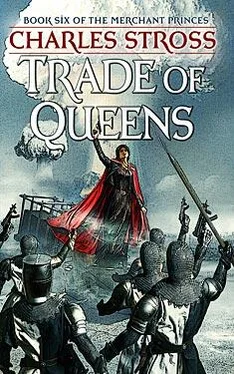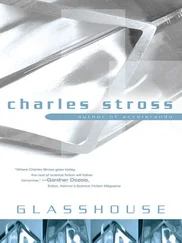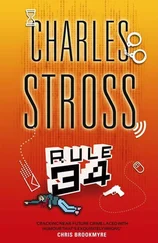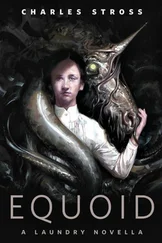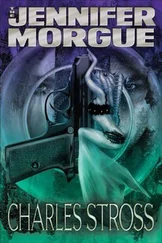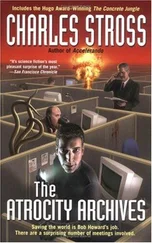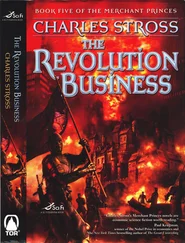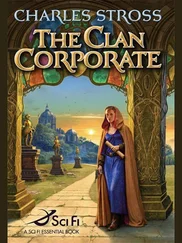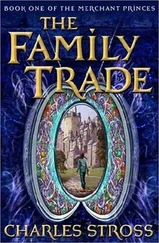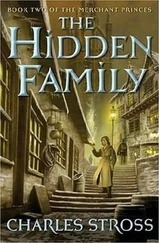Charles Stross - MP 6 -The Trade of Queens
Здесь есть возможность читать онлайн «Charles Stross - MP 6 -The Trade of Queens» весь текст электронной книги совершенно бесплатно (целиком полную версию без сокращений). В некоторых случаях можно слушать аудио, скачать через торрент в формате fb2 и присутствует краткое содержание. Жанр: Старинная литература, на английском языке. Описание произведения, (предисловие) а так же отзывы посетителей доступны на портале библиотеки ЛибКат.
- Название:MP 6 -The Trade of Queens
- Автор:
- Жанр:
- Год:неизвестен
- ISBN:нет данных
- Рейтинг книги:4 / 5. Голосов: 1
-
Избранное:Добавить в избранное
- Отзывы:
-
Ваша оценка:
- 80
- 1
- 2
- 3
- 4
- 5
MP 6 -The Trade of Queens: краткое содержание, описание и аннотация
Предлагаем к чтению аннотацию, описание, краткое содержание или предисловие (зависит от того, что написал сам автор книги «MP 6 -The Trade of Queens»). Если вы не нашли необходимую информацию о книге — напишите в комментариях, мы постараемся отыскать её.
MP 6 -The Trade of Queens — читать онлайн бесплатно полную книгу (весь текст) целиком
Ниже представлен текст книги, разбитый по страницам. Система сохранения места последней прочитанной страницы, позволяет с удобством читать онлайн бесплатно книгу «MP 6 -The Trade of Queens», без необходимости каждый раз заново искать на чём Вы остановились. Поставьте закладку, и сможете в любой момент перейти на страницу, на которой закончили чтение.
Интервал:
Закладка:
"But my husband—"
"He'll make it out here." Heyne's tone brooked no argument, even though his words were spoken with the voice of optimism rather than out of any genuine certainty. "Don't doubt it."
"But if we can't go back"—she frowned—"what use are we to them?"
Heyne shook his head. "Nobody's told me yet. But you can be sure Her Majesty has something in mind."
Stumbling through workdays like nothing he'd ever seen before, walking in a numb haze of dread, Steve Schroeder had spent the weeks since 7/16 waiting for the other shoe to fall.
There was the horror of the day's events, of course, and then the following momentous changes. Agent Judt sitting in one corner of the office for the first week, a personal and very pointed reminder that he'd accidentally turned down the kind of scoop that came along once in a lifetime—a chance to interview Osama bin Laden on September the twelfth—and then the consequences as the scale of the atrocity grew clearer. Then the surreal speech by the new president, preposterous claims that had no place in a real-world briefing; he'd thought WARBUCKS was mad for half an hour, until the chairman of the Joint Chiefs came on-screen on CNN, gloomily confirming that the rabbit hole the new president had jumped down was in fact not a rabbit hole at all, but a giant looming cypher like an alien black monolith suddenly arrived in the middle of the national landscape—
And then the India-Pakistan war, and its attendant horrors, and the other lesser reality excursions—the Israeli nuclear strike on Bushehr, the riots and massacres in Iraq, China's ballistic nuclear submarine putting to sea with warheads loaded and the tense standoff in the Formosa Strait—and then the looking-glass world had shattered, breaking out of its frame: the PAPUA Act, arrests of radicals and cells of suspected parallel-universe sympathizers, slower initiatives to bring forward a national biometric identity database, frightening rumors about the military tribunals at Guantanamo that had so abruptly dropped out of the headlines—
One day, after a couple of apocalyptic weeks, Agent Judt wasn't there anymore. And when a couple of days later the president had his third and fatal heart attack and there was a
new
president, one who spoke of
known unknowns
and
unknown unknowns
and seemed to think Dr. Strangelove was an aspirational role model, there was a new reality on the ground. The country had gone mad, Steve thought, traumatized and whiplashed by meaningless attacks: 9/11 and strange religious fanatics in the Middle East had been bad enough, but what was coming next?
Flying saucers on the White House lawn? Not that there was any White House lawn for them to land on, anymore. (WARBUCKS had promised to rebuild, once the radiation died down, but that would take months or years.)
Two weeks after the attack, Steve went to see his HMO and came away with a prescription for Seroxat. It helped, a bit; which was why, on his way home from a day shift one evening, he was alert enough to realize he was being followed.
Downtown Boston was no place to commute on wheels. Like most locals, Steve relied on the T to get him in and out, leaving his truck in a car park beside a station. He didn't usually pay much attention to his fellow passengers—no more than enough to spot a seat and keep a weather eye open for rare-to-nonexistent muggers—but as he got off a Green Line streetcar at Kenmore to change lines something drew his attention to a man stepping off the carriage behind him. Something familiar about the figure, glimpsed briefly through the crowd of bodies, triggered a rush of unease. Steve shivered despite the muggy heat and hurried across the tracks behind the streetcar, heading for his own platform.
It can't be him,
he told himself.
He spooked and ran.
He looked around behind him, but the half-recognized man wasn't there anymore.
What to do? Steve shook his head and hunkered down, waiting for the C Line train to North Station.
He knew something was wrong about five seconds after his train began to squeal and shudder away from the platform; knew it from the hairs on the back of his neck and the slight dip of his seat as the man behind him leaned forward, putting his weight on the seat back. "Hello, Steve."
He tensed. "What do you want?" It was hot in the streetcar, but the skin in the small of his back felt icy cold.
"I'm getting off at the next stop; don't try to follow me. I think you might like to have a look at these files. There's an email address; mail me when you want to talk again." A cheap plastic folder bulging with papers thrust over the seat back beside him like an accusing affidavit. He caught it before it spilled to the floor.
"What if I don't want to talk to you?" he asked thinly.
The man behind him laughed quietly. "Give it to your FBI handler. He'll shit a brick."
The streetcar slowed; Steve, too frightened to look round as the man behind him stood up, clutched the folio to his chest.
Jesus, I can't just let him get away—
Too late: The doors opened with a hiss of compressed air. Steve began to turn, caution chiding him—He
might be armed—but
he was too late. Mike Fleming, Beckstein's friend, had disappeared again. Steve subsided with another shudder.
Fleming knows too damn much,
he thought. He'd known about 7/16 before it happened.
What if he was telling the truth? What if it's an inside job?
The prospect was unutterably terrifying. The looking-glass world news nightmare that had engulfed everything around him a month ago was bad enough; the idea that there really was a conspiracy behind it, and his own government shared responsibility for it, left Steve feeling sick. This was a job for Woodward and Bernstein, not him. But Bob Woodward was dead—one of the casualties of 7/16—and as for the rest of it, there was no one else to do whatever needed doing.
I could phone Agent Judt,
he told himself.
I could.
A week or two ago, before the latest wave of chaos, he'd probably have done so immediately. But the end-times chaos of the past month had unhinged his reflexive loyalty to authority just as surely as it had reinforced that of millions of others. He unzipped the folio and glanced inside quickly. There was a cover sheet, laser-printed; he began reading.
8/18
It is a little-known fact that, contrary to public mythology, the president of the United States of America lacks the authority to order a strategic nuclear attack. Ever since the dog
days of the Nixon administration, when the drunken president periodically phoned his diminishing circle of friends at 3:00 A.M. to rail incoherently about the urgent need to nuke North Vietnam, the executive branch has made every effort to insure that any such decision can only be made stone-cold sober and after a lengthy period of soul-searching contemplation. An elaborate protocol exists: A series of cabinet meetings, consultations with the Joint Chiefs, discussions with the Senate Armed Services Committee, and quite possibly divine intervention, a UN Security Council Resolution, and the sacrifice of a black goat in the Oval Office at midnight are required before such a grave step can be placed on the table for discussion.
However . . .
Retaliation in the aftermath of an attack is
much
easier.
If WARBUCKS put the plan in motion, diverted superblack off-budget funds to the Family Trade Organization, jogged BOY WONDER'S elbow to sign the presidential orders setting in motion the research program to build machines around slivers of vivisected neural tissue extracted from the brains of captured Clan world-walkers, then perhaps the blame might be laid at his door. But it was his successor in the undisclosed location, former mentor and then vice president by appointment, who organized the details of the strike and bullied the Joint Chiefs into drafting new orders for USSTRATCOM tasking them with a mission enabled by the new ARMBAND technology. And it was the Office of the White House Counsel who drafted legal opinions approving the use of nuclear weapons in strict retaliation against an extradimensional threat, confirming that domestic law did not apply to parallel instances of North American geography, and that the two still-missing SADM demolition devices were necessary and sufficient justification: that such an operation constituted a due and proportionate response in accordance with international law, and that the Geneva conventions did not apply beyond the ends of the Earth.
Читать дальшеИнтервал:
Закладка:
Похожие книги на «MP 6 -The Trade of Queens»
Представляем Вашему вниманию похожие книги на «MP 6 -The Trade of Queens» списком для выбора. Мы отобрали схожую по названию и смыслу литературу в надежде предоставить читателям больше вариантов отыскать новые, интересные, ещё непрочитанные произведения.
Обсуждение, отзывы о книге «MP 6 -The Trade of Queens» и просто собственные мнения читателей. Оставьте ваши комментарии, напишите, что Вы думаете о произведении, его смысле или главных героях. Укажите что конкретно понравилось, а что нет, и почему Вы так считаете.
